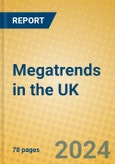The Megatrends in the UK report analyses factors influencing national consumer expenditure. Consumer lifestyles reports include coverage of: population, urban development, home ownership, household profiles, labour, income, consumer and family expenditure, health, education, eating habits, drinking habits, shopping habits, personal grooming, clothing, leisure habits, savings and investments, media, communication, transport and travel and tourism. Use this report to understand the factors influencing a nation's lifestyle choices.
Data coverage: Market sizes (historic and forecasts), company shares, brand shares and distribution data.
Why buy this report?
- Get a detailed picture of the Megatrends market;
- Pinpoint growth sectors and identify factors driving change;
- Understand the competitive environment, the market’s major players and leading brands;
- Use five-year forecasts to assess how the market is predicted to develop.
Table of Contents
- Scope
- Businesses harness megatrends to renovate, innovate and disrupt
- The drivers shaping consumer behaviour
- Megatrends framework
- Convenience and technology will continue to shape UK lifestyles
- Convenience
- Uber Eats innovates with pick and pack service for grocery deliveries
- Consumers yearn for a less complicated life
- Employees are looking for better work-life balance
- Millennials prefer online shopping
- E-commerce offers shoppers more flexibility
- Younger consumers seek more convenient meal solutions
- Digital living
- AI-powered “roomscrolling” app Jitty expands to central London
- Consumers use advanced tech to enhance their experiences
- More than half of consumers are averse to targeted advertisements
- Millennials will share their data, provided it is carefully managed
- Consumers lack trust in company ads
- Face-to-face activity is expected to increase post-pandemic
- Diversity and inclusion
- Specsavers makes children’s glasses range more inclusive
- Higher share of consumers tend to express their opinions on social media
- Millennials invest time and money in good causes
- Most British feel comfortable in their skin
- Consumers start to hold companies to account
- Experience more
- Boots’ new beauty concept store offers a range of experiences
- Consumers return to cultural venues in the aftermath of the pandemic
- Relaxation and personal safety are key considerations for holidaymakers
- Millennials are eager to make memories
- Personalisation
- Tailored dog meal provider Marleybones set for expansion
- Millennials are the most open to targeted offers
- British are less keen than global counterparts on tailored experiences
- Premiumisation
- Nescafé invests in an indulgent coffee collection
- Millennials are eager to stand out from the crowd
- Shoppers are become more discerning about their purchases
- Nutrition and taste are the top attributes in food
- Pursuit of value
- Morrisons launches price-matching scheme in bid to rival discounters
- Consumers shop around more as budgets are squeezed
- Millennials feel the least vulnerable
- Consumers embrace the circular economy
- Gen Z are the thriftiest cohort
- Shopper reinvented
- Tesco expands its online offering with new third-party marketplace
- Millennials place their trust in celebrity endorsements
- Shoppers buy more online, but still prefer physical stores for clothing
- Social media platforms emerge as the latest shopping channel
- Younger generations are the most active on social media
- Sustainable living
- Marks & Spencer expands its “Refilled” scheme for own label home care products
- Mindful consumerism is on the rise
- Baby boomers are the keenest recyclers
- Reducing food waste and plastic are top priorities
- Citizens are turning to social media to voice their opinions
- Consumers want packaging that can be recycled
- Wellness
- Social media influencer launches innovative symbiotic supplement for gut health
- Consumers focus on holistic ways to alleviate stress
- Millennials turn to supplements that promote good health
- Consumers continue to take precautions post-pandemic
- Leverage the power of megatrends to shape your strategy today








